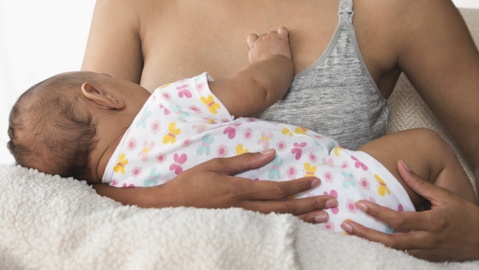After marathon runner Aliphine Tuliamuk protested being banned from bringing her breastfeeding daughter to the Olympic Games in Tokyo, the International Olympic Committee (IOC) has now reversed their mandate.
Due to COVID-19 protocols, the IOC stated earlier this summer that breastfeeding athletes would have to leave their babies at home, placing Tuliamuk in a compromising position.
"When they put restrictions in and sent us an email that she wasn't going to be able to come, I was really devastated," the 32-year-old told
Good Morning America. "What do they expect us to do? I can't just leave my breastfeeding child behind."
In response, Tuliamuk decided not to accept the IOC’s new regulation, which would force her to choose between her newborn and her lifelong dream. She subsequently appealed by letter to the IOC, explaining how imperative it is to have a child by her side while competing in the most important athletic competition in the world.
Tuliamuk was not the only athlete affected by the IOC’s rule. At the end of June, USA women’s soccer team player, Alex Morgan, also vocalized her concerns on the matter.
“Still not sure what when necessary' even means. Is that determined by the mother or the IOC? We are Olympic mothers telling you, it is NECESSARY,” Morgan wrote in a tweet. “I have not been contacted about being able to bring my daughter with me to Japan and we leave in 7 days."
Still not sure what "when necessary" even means. Is that determined by the mother or the IOC? We are Olympic mothers telling you, it is NECESSARY. I have not been contacted about being able to bring my daughter with me to Japan and we leave in 7 days. #Tokyo2020
#USWNT
#TeamUSA
https://t.co/cNGMt8w0Ss— Alex Morgan (@alexmorgan13) June 30, 2021
In early July, after push from various athletes and people across the globe, the IOC reversed the decision, allowing Tuliamuk to bring her daughter, Zoe, to the Games.
"After careful consideration of the unique situation facing athletes with nursing children, we are pleased to confirm that, when necessary, nursing children will be able to accompany athletes to Japan," the committee said in a statement obtained by ABC News.
The U.S. marathoner said she was “full of gratitude” after the regulation was rescinded, expressing that she didn’t know what she was going to do if she had to make an “unimaginable” call.
"I couldn't imagine," Tuliamuk said, CBS News reported. "I mean, thinking about it still makes me want to cry."
The Kenyan native also shared that she drew inspiration to speak out from other prominent female athletes like Allyson Felix, Kara Goucher and Alysia Montaño, who said they were penalized by Nike in 2019 for being pregnant.
"If we want to support female athletes, part of being a female athlete is also having a family and if you want to support me as a complete athlete, you should be able to make room for my family. You should be able to make room for me if I decide to have a family," Tuliamuk said. "You can't just talk about supporting women and then not actually support them.Tuliamuk hopes that her efforts will inspire young women, including her daughter, to speak up for themselves in times of adversity."
"I want to make sure my daughter understands that this world is not easy but that does not mean that you give up. It means that you double down and you work very, very hard and you seize every opportunity that you get," she added. "That's how you achieve your goals."
